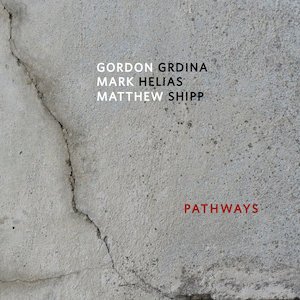Label: Attaboygirl Records, 2022
Personnel - Gordon Grdina: guitar, oud; Mark Helias: bass; Matthew Shipp: piano.
New York-based Canadian guitarist and oud player Gordon Grdina is seen here with bracing partners and stalwarts of the downtown jazz scene, Mark Helias on bass and Matthew Shipp on piano. Pathways, their sophomore album (succeeding to the 2019 Skin and Bones), consists of a fully improvised set of pieces with risk-taking propensity. The result is challenging for the ears but never uncomfortable.
The opener, “Palimpsest” provides a poetic, if duskier, musical experience. Dark and wistful tones take over, with Grdina and Shipp perfectly integrated in a plaintive melancholy, while Helias roams freely, variating intensity and speed. The free diction of “Deep Dive” seems to have kinetic forces pushing it forward, and glimpses of a hidden blues emerge by the end.
With a fabulous interplay and a dazzling assortment of ostinatos, “Trimeter” is a dance from afar with plenty of harmonic coloration and exhilarating crossing rhythms getting underway. The numbers where the oud is present, namely the expressionistic “Synapses” and the concluding piece, “Sanctum”, also cultivate an unconventional language with the help of an exquisite instrumentation. The former cut feels positively revolutionary in its stirring motion, whereas the latter, non-obvious in the moves and alluring in texture, has Grdina looking for those microtones to bend and warp, leaving you with and exquisite feel and atmosphere. These are musicians who are not afraid to travel outside the conventional jazz universes.
Complex phrasal architectures come into view on the deliberately suspenseful title track, which creates enough tension and bendability en route. In the back, Helias is strong as a rock, rolling to the sides with propulsive drive and returning to the point of origin with determination; Shipp asks questions in a particular register and responds to himself in another; Grdina makes the perfect foil for those two, countering with lines that later converge with the pianist’s. Their rhythmic prowess is even more striking on “Flutter”, an abstract mesh with interesting percussive fluxes and appeasing moments alike.
Grdina’s output has been more and more prolific but consistently interesting. This recording cannot be classified as just another.
Favorite Tracks:
01 - Palimpsest ► 04 - Trimeter ► 08 - Synapses














